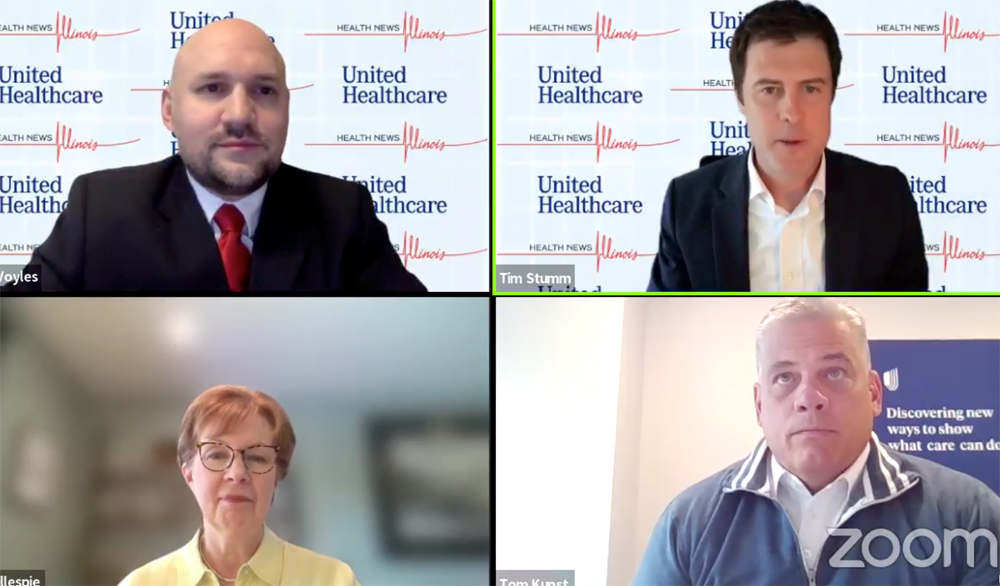The Department of Insurance is staffing up, hoping to add nearly 40 positions as it implements a bevy of changes to the state’s insurance industry passed by lawmakers in recent legislative sessions.
That includes a transition to a state-based health insurance exchange, a bolstering of network adequacy standards and new restrictions on prior authorization and step therapy.
During a Health News Illinois virtual event this week, Acting Director Ann Gillespie discussed how these changes will impact the industry and what the department is doing to implement them.
Edited excerpts are below. Watch the full event here.
HNI: Gov. JB Pritzker recently signed into law legislation that raises network adequacy and transparency standards and increases restrictions on step therapy and prior authorization. How will that impact patients?
Gillespie: The goal is that everybody who’s covered under a fully insured plan today is going to be able to access their services in a much more transparent fashion and in a way that doesn’t put the patient in the middle. The challenge with step therapy, with prior authorization, with those kinds of things, is that the patient was often having to navigate between what their insurance company told them they had to do versus what their doctor was telling them they should do. The goal of these is to take the consumer out of the middle.
HNI: How much will these changes cost? What will that mean for premiums?
Gillespie: It shouldn’t result in huge increases in premiums. The reason being that a lot of the changes that we’re making, particularly the prior authorization changes, plans were telling us that they were already basing those on clinical protocols. So if that’s the case, we really shouldn’t see a big impact on premiums. But if there are changes, we’re going to be examining them through our new authority to do rate review. And we’ll be determining that those rates are not discriminatory and that they are actuarially sound.
HNI: The state is set to transition to a state-based health insurance exchange for the 2026 plan year. What’s the latest on those efforts?
Gillespie: We’re doing a lot of work. We brought on board a marketplace director, Morgan Winters, who is leading the transition of Get Covered Illinois to the state-based marketplace. He’s got tremendous experience coming from Minnesota and their state-based exchange … We’re in the (request for information) process for the platform. And then we will have very in-depth implementation plans. We are meeting weekly. And some groups are meeting more frequently than that in order to get this up and running.
One of the things that I want to point out is that we do have an oversight group … made up of members of the insurance community, the broker community, the provider community and consumer advocacy groups who are helping us with the overall implementation and providing us feedback on the choices that are being made.
HNI: What’s the benefit of a state-based exchange over the federal exchange?
Gillespie: It protects the state a little bit from changes in administration or changes in approach at the federal level, so we have some core consistency. It also allows for us to be a little more creative in how we’re addressing unique needs in Illinois.
HNI: What are some of the challenges you are facing with this transition?
Gillespie: Anytime you’re making a big transition like this, especially if it involves an IT platform, there’s always challenges with that, right? So we’re going to be doing a lot of testing so that we can make sure the system works as we intend it to work.
There’s some education that goes on with the broader community in particular to make sure they understand how the new platform is going to work. And we will do everything we can to make sure that folks stay covered the whole time, so that nobody drops off as part of the transition.
HNI: What are you doing to recruit and retain workers for the department?
Gillespie: We’re hiring in both Chicago and in Springfield to give us the ability to pull from across the state. We’re also doing a new approach that we started a few months ago, which is a trainee approach. That allows us to hire folks that don’t have the experience levels that we might otherwise be recruiting for to come in, and we do an intensive training with them to give them those basic insurance skills that they need. We’ve had 34 people graduate from those trainee programs so far, and be employed full time. And we’ve got six more that are coming on board now.
